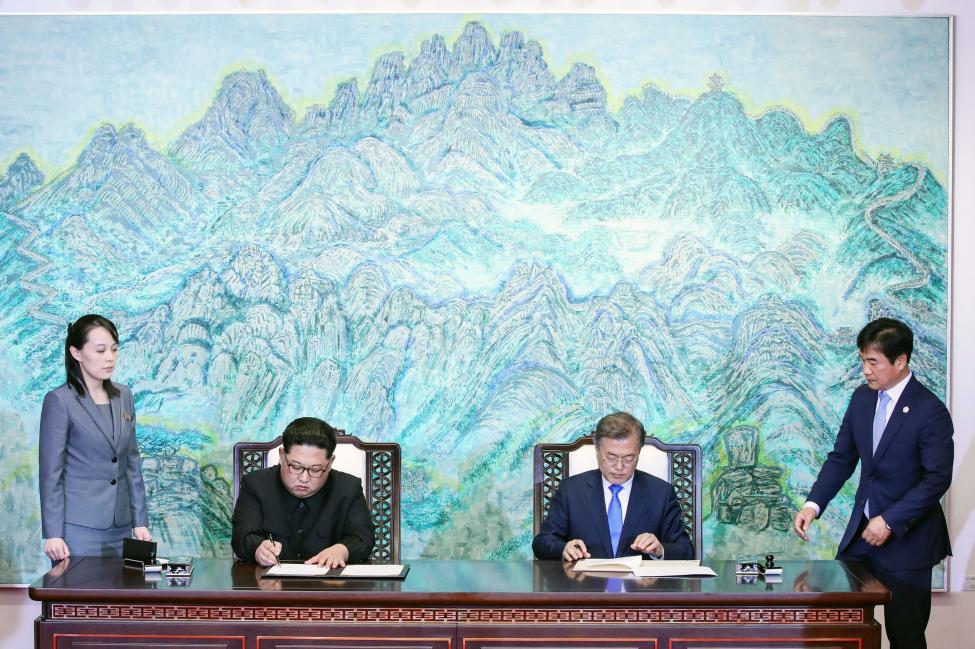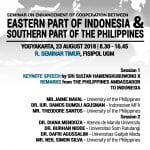Panmunjom Agreement: The Role of ASEAN behind the Pacified Peninsula
Rafyoga Irsadanar
A new stage of peacemaking had progressed in the Korean Peninsula as Kim Jong Un and Moon Jae-in declared that there will be no more war in the region. This great momentum of peace among the President of Republic of Korea and Chairman of the State Affairs Commission of the Democratic People’s Republic of Korea happened during 2018 Inter-Korean Summit in “Peace House” at Panmunjom on April 27th. Under the “Panmunjom Declaration for Peace, Prosperity and Unification of the Korean Peninsula”, both parties agreed to denuclearize Korean Peninsula and to conduct more talk with the United States in officially bringing Korean War to a permanent end.
A great advancement of perpetual harmony between North and South Korea, indeed, involved many external parties in pacifying the tension. Even though the security issues in the Korean Peninsula mainly spotlighted the credit to East Asian countries (Japan, China and two Koreas) and the United States, the contribution of ASEAN as the neighboring regional power could not be easily overlooked.
ASEAN- Two Koreas Warm Relationship: A Strong Bargain
It is undeniable that ASEAN itself is still struggling in building its firm institutional power in managing their own region, therefore, at some point, one may doubt ASEAN role in putting North and South Korea back into a constructive negotiation. However, what matters in the negotiation is ASEAN strategic position in convincing both parties to express their cooperative endeavor. It is important to note that ASEAN has a strong political capital to begin with.
By default, ASEAN and the Koreans have a strong bond in various aspects. North Korea, despite its isolative tenet, surprisingly has progressive political and economic relations with ASEAN. Not only North Korea has diplomatic relations with all ASEAN member states, North Korea also actively participated in ASEAN Regional Forum (ARF) to foster the security stability in Asia-Pacific. Economically, from 2000 to 2006 North Korea’s trade with Southeast Asian nations was able to reach 12 percent of the country whole balance. Simultaneously, South Korea and ASEAN obviously have a firm both political and economic cooperation as well. Besides the fact that South Korea and ASEAN regularly held ministerial and bilateral summits, ASEAN is Korea’s second largest trading partner under the ASEAN-Korea Free Trade Agreement (AKFTA). These warm ties of ASEAN and the conflicting parties are the main ASEAN decisive bargain in persuading the two Koreas to peace.
ASEAN Regional Forum
The prominent relationship of ASEAN and two Koreas has escalated the urgency of ASEAN involvement as South Korea recognized ASEAN as the “fifth power”. The robust economic ties between ASEAN and North Korea also caused Trump Administration demanding ASEAN to cut the trade and financial aids to pressure North Korea, proving ASEAN importance to North Korea. However, in engaging to the issue, ASEAN took a softer approach which is making the best of the existing platform, ASEAN Regional Forum, to be a constructive peaceful talk among conflicting parties in regards to North Korea assertive actions. There are two interconnected reasons why this is exclusive as ASEAN role in pacifying the Peninsula tension:
First, ASEAN Regional Forum is the only multilateral platform where both South and North Korea are encountered to each other in regards to security issues after the failure of Six-Party Talks. This means, ASEAN is the only actor who could bridge the states in Asia-Pacific with North Korea in regards to denuclearization through an official interstate channel. As the aftermath of ARF 2017 Manila, this ASEAN-initiated forum could gather the interest of all its member state to positively and legitimately demand North Korea, as ARF member, to reconsider its nuclear projects since it threatened Asia-Pacific stability. In addition, ARF initial trajectory in welcoming North Korea membership in 2000 was to engage with North Korea softer approach instead of isolating them, as it also appear as the turning point of Inter-Korean Relations at that time, ASEAN Chairman on that period Surin Pitsuwan stated. Hence, ASEAN contribution in providing the peace talk circuit should be credited to this context.
Second, not only ASEAN could provide the progressive platform, but also has a great potential to sustain it subsequently as a mediating actor. This optimism arises as ASEAN could appear as a friendlier partner toward North Korea. For North Korea, ASEAN is the easier counterpart to talk to compared to the United States, South Korea, China, Japan, and Russia.
North Korea trust toward ASEAN could be seen as ASEAN (and a couple of South Asian countries) is the only regional arena where North Korea engaging the most, proven by the number of its envoys sent to ASEAN (added with India and Bangladesh). North Korea admitted that this high level of interaction with ASEAN was caused by its “traditional friendship” established among them. This “traditional friendship” between North Korea and ASEAN was nurtured as North Korea could find its socialist-communist counterparts in ASEAN such as Vietnam, Cambodia, and Laos. Not to mention its strong connection with Indonesia socialist-friendly regime under President Soekarno also appeared as the additional value of the relationship. Therefore, no wonder that ASEAN is currently seen as a potential actor to maintain the conductivity of the peacemaking as ASEAN is recognized as the one who could communicate with North Korea best.
From these metrics, we can see that trust is the main spearhead that made ASEAN-Koreans friendship possible to sustain. To maintain the maneuvers progressive, this article suggests that ASEAN should maintain its neutrality and strengthen its non-intervention tenet. These two parameters are vital to gain the trust of all parties since it will shape ASEAN as a truthful ally to cooperate with. Also, the non-intervention principle may also show South and North Korea that ASEAN is open to all values, proven by its commitment to not pushing any of its member state against their own identity.
The writer is a Research Intern at the ASEAN Studies Center Universitas Gadjah Mada





